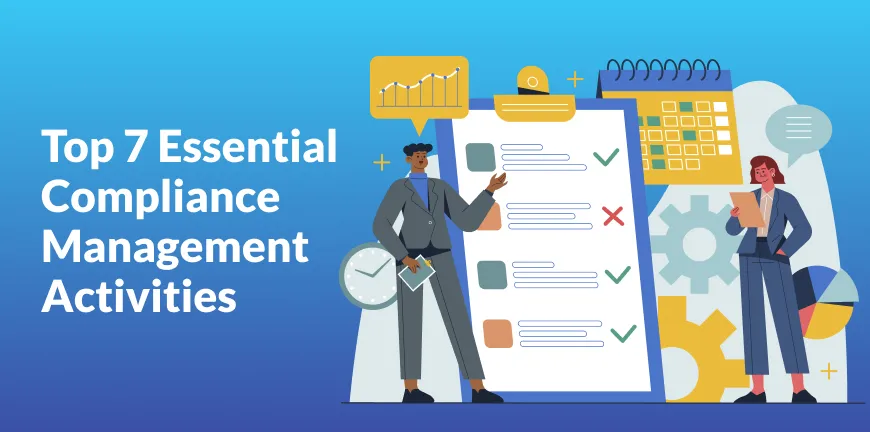
Importance of Staffing: Definition, Benefits and Steps
19/09/2025
What Is Pay Scale? Definition, Importance, and Factors Explained
21/09/2025- What Are Compliance Activities?
- 7 Key Compliance Management Activities Every Business Must Implement
- 5 Key Benefits of Deploying Robust Compliance Activities
- 5 Common Challenges in Compliance Management
- 5 Best Practices for Effective Compliance Activities
- Key Takeaways
- Conclusion
- Frequently Asked Questions (FAQs)
“Compliance is not optional… While a culture of integrity and ethics takes years to build, it only takes a moment to lose.”- Donald K. Thorp, CEO, Prinova.
Companies can no longer treat compliance as just a legal requirement, but rather a pathway for improving internal processes and policies to achieve better business outcomes & enhance brand value.
However, tackling compliance challenges is not a piece of cake, as it involves putting together an expert compliance team, dedicating time and resources, & overhauling the entire business operations to meet the latest regulatory requirements.
Let’s dive deep and understand 7 essential compliance activities that companies must execute diligently to improve compliance and achieve sustained success!
What Are Compliance Activities?
Compliance Activities are a host of structured processes, policies, & monitoring mechanisms that companies deploy organisation-wide to make sure perfect alignment is accomplished with pertinent laws, regulations, industry standards, & internal policies. These regulatory compliance activities ensure the business stays on the right path by meeting current ethical expectations, mitigating risks, & maintaining transparency in operations.
Currently, businesses across India are intercepting an intricate net of 1,500+ acts & 69,000 compliance requirements, with new mandates popping up like mushrooms in areas like data management, AI, & ESG reporting. To overcome such challenges & achieve business continuity, companies must ensure business compliance activities are optimised regularly to always align with the latest regulations.
The key goals of investing time & resources in these Compliance Management Activities include:
- Ensuring conformity with legal & regulatory requisites applicable to the sector & jurisdictions.
- Mitigating & preventing financial, reputational, & operational risks triggered by non-compliance.
- Promoting ethical practices & accountability across all business areas.
- Building stakeholder trust by demonstrating integrity & good governance.
- Supporting sustainable business growth via risk-free decision-making.
Here is a real-world example that demonstrates the importance of compliance monitoring activities:
In the banking sector, compliance activities are paramount to counter financial fraud. For instance, banks must align their internal policies in accordance with Anti-Money Laundering (AML) regulations. They perform compliance conforming tasks such as verifying customer identities (KYC checks), monitoring suspicious transactions, & sending detailed reports to regulators. This protects the bank from legal hassles as well as strengthens customer trust by ensuring funds are handled securely from end to end.
Thus, compliance activities serve as both a shield and a strategic enabler, aligning organizational practices with regulatory expectations while fostering a culture of responsibility.
7 Key Compliance Management Activities Every Business Must Implement
In today’s dynamic business terrain, compliance is more than just a legal obligation; it’s a cushion for growth, trust, & sustainability. Effective compliance management activities act as a catalyst to help organizations minimize risks, adapt to evolving regulations, & foster accountability.
Here are 7 key compliance activities every business must deploy to stay ahead of the curve and to gain a good reputation with authorities:
1. Policy Development & Documentation
Clear policies act as the cornerstone of compliance. They provide employees with written guidelines on acceptable practices, regulatory requirements, & reporting structures. Additionally, industries like banking, healthcare, & IT rely heavily on robust compliance policy implementation to maneuver strict regulations.
A Greenshades study shows that 40% of breached records in 2024 involved employee PII (Personally Identifiable Information), costing $189 per record. Clear policies on data use and well-established internal compliance processes can prevent such instances of breaches.
For example, a bank implementing strict data-handling policies reduces the risk of financial crimes, ensuring both compliance with AML guidelines & customer trust. Documented policies thus safeguard sensitive data while minimizing regulatory risks.
2. Employee Training & Awareness
Even the best policies fail without employee awareness and turn into a Wishlist. Regular training as a part of corporate compliance activities ensures the workforce knows the rules to be followed & the consequences of breaching them.
In manufacturing & healthcare, employee training reduces compliance lapses & workplace accidents. The healthcare sector experiences some of the highest data breach costs globally, averaging $6.45 million per incident.
For example, a hospital that trains staff on HIPAA & cybersecurity prevents costly breaches & enhances patient confidence. Additionally, training empowers employees to act as the first line of defence against compliance risks.
3. Regulatory Monitoring & Updates
With compliance-related laws undergoing changes & amendments frequently and rapidly, businesses must stay alert to new requirements. Industries like oil & gas, telecom, and financial services face constant regulatory updates across different areas of business.
A Secureframe report highlights that the average global cost of a data breach reached $4.88 million in 2024, up 10% year-over-year. Regulatory monitoring as a part of compliance audit activities helps avoid these expensive incidents.
For instance, an oil company closely tracking emission regulations ensures operational adjustments are made on time, preventing both fines and reputational damage. Proactive compliance monitoring activities protect both compliance health & profitability.
4. Risk Assessment & Mitigation
Compliance risks must be pinpointed before they escalate and become expensive violations. Including this as a component of compliance activities is critical in finance, IT, and insurance, where lapses carry financial & legal repercussions. IBM found that healthcare breaches cost $6.45 million on average, showing the heavy price that companies must bear for unmitigated risks.
For example, a financial services firm performs quarterly risk assessments, identifying weaknesses in anti-money laundering (AML) systems. By plugging those gaps, it avoids penalties & reassures regulators of strong governance. Moreover, risk assessments deployed as a part of internal compliance processes allow businesses to anticipate problems and build resilience.
5. Internal Audits & Monitoring
Compliance audit activities are used to verify compliance effectiveness & uncover weaknesses. They are widely used in healthcare, education, & manufacturing to maintain governance standards. Numerous studies show that 85% of ISO-9001-certified companies report improved reputation & efficiency due to internal audits.
For example, a manufacturer conducts regular internal audits or partners with a top compliance audit agency like Alp Consulting to assess worker safety practices. By addressing minor issues early, the firm passes government inspections seamlessly while building a reputation for safety and reliability. Audits, both internal and external, make compliance proactive rather than reactive.
6. Incident Reporting & Resolution
When compliance issues arise, fast reporting and resolution limit damage. Making this a part of compliance management activities is vital in IT, pharmaceuticals, and aviation, where lapses can be catastrophic. With the average breach costing $4.88 million globally in 2024-25, incident response becomes a financial necessity.
For instance, an IT company installs an automated system for logging security breaches. A minor intrusion is detected & resolved quickly, reported to regulators, & documented for transparency. This targeted approach minimizes impact while demonstrating a strong compliance posture to clients and regulators alike.
7. Continuous Improvement & Compliance Culture
Compliance is not a static process; it requires constant evolution. Embedding compliance into company culture ensures resilience across industries such as energy, BFSI, and government contracting. Healthcare data proves the stakes: $6.45 million average breach cost, showing why continuous vigilance is needed. For instance, an energy firm ties compliance metrics to leadership performance reviews.
Managers model ethical behaviour, employees follow, & compliance becomes routine. Over time, this culture reduces violations, supports ESG commitments, and strengthens corporate reputation in competitive markets.
5 Key Benefits of Deploying Robust Compliance Activities
Here are 5 key benefits of deploying high result yielding compliance activities:
1. Reduced Financial Penalties
One of the most immediate benefits of strong regulatory compliance activities is the prevention of hefty fines and legal costs. By systematically adhering to industry regulations, companies can minimize the instances of violations. This is especially imperative in sectors like finance, healthcare, & IT, where even minor lapses can lead to chaotic results.
IBM’s 2024-25 “Cost of a Data Breach” report revealed that the average global breach cost rose to $4.88 million, a clear warning of the financial consequences of weak compliance. Deploying robust compliance activities directly safeguards profitability and reduces unnecessary financial drains.
2. Enhanced Reputation & Trust
Trust is the cornerstone of long-term business success, & compliance plays a major role in building it. A company that demonstrates integrity & regulatory adherence naturally earns credibility with customers, investors, and regulators. In industries like healthcare & energy, reputation can make or break competitive advantage.
Research shows that 85% of ISO-9001-certified companies improved their reputation & efficiency through structured compliance audit activities. This highlights how proactive compliance is not only about risk reduction but also about building a strong brand presence rooted in transparency and accountability.
3. Operational Efficiency
Compliance monitoring activities streamline internal processes, eliminate redundancies, & foster accountability. Clear policies and monitoring systems reduce ambiguity, enabling faster decision-making & smoother workflows. This is especially valuable in industries with complex operations such as oil & gas or manufacturing. According to PwC, 79% of organizations with effective compliance programs report enhanced operational efficiency.
For example, integrated compliance management systems can minimise manual paperwork in HR or finance, saving both time & resources. Thus, compliance management activities are not a bottleneck; they become a driver of productivity and efficiency across the enterprise.
4. Employee Accountability & Awareness
Employees form the front line of compliance, & robust programs ensure they know their responsibilities. Regular training as a part of regulatory compliance activities creates awareness of rules, consequences of breaches, & reporting protocols. Without this, even small mistakes can lead to major risks. Deloitte reports that 62% of compliance breaches are due to employee negligence or unawareness.
A strong compliance framework that includes regular workshops, simulations, & e-learning fosters accountability. This not only reduces errors but also empowers employees to act ethically, reinforcing a company-wide culture of responsibility & compliance readiness.
5. Long-Term Business Sustainability
Beyond short-term benefits, corporate compliance activities ensure organizations remain adaptable to evolving regulations & market expectations. With ESG and data privacy laws becoming global priorities, businesses with strong compliance programs are better positioned for sustainable growth.
Thomson Reuters’ Cost of Compliance survey found that 65% of firms consider compliance culture the biggest enabler of long-term success. For example, an energy company that proactively integrates compliance into ESG strategies attracts investors, maintains licenses, & strengthens market positioning. Thus, compliance management activities become a strategic lever for resilience, competitiveness, and sustainability.
5 Common Challenges in Compliance Management
Here are the 5 key challenges faced by companies in enforcing robust compliance activities:
1. Constantly Changing Regulations
Businesses typically struggle to keep pace with evolving local, national, & international laws. Frequent updates demand continuous monitoring & adaptation, creating compliance fatigue and risking accidental violations.
2. Complex Multi-Jurisdiction Compliance
Companies operating across states or countries face overlapping, sometimes conflicting regulatory requirements. Navigating diverse tax, labour, & industry-specific laws creates administrative burdens & elevates compliance error risks.
3. High Cost of Compliance Implementation
Maintaining regulatory compliance activities requires significant investment in technology, training, & audits. For smaller firms with limited resources, balancing compliance costs with business growth can be extremely challenging and unaffordable.
4. Employee Awareness & Engagement Gaps
Even well-drafted compliance policy implementations fail if employees lack understanding. Also, poor training & low awareness contribute to non-compliance, negligence, & breaches. This often results in financial penalties & reputational damage.
5. Data Security & Privacy Risks
With increasing digitization, safeguarding sensitive employee, financial, and customer data is paramount. Also, cyberattacks, weak security systems, or poor controls expose businesses to severe regulatory fines & loss of trust.
5 Best Practices for Effective Compliance Activities
Here are 5 best practices for effectively managing compliance activities:
1. Automate compliance monitoring activities
Adopt AI-driven tools & compliance software to track regulatory changes in real time. This will minimize manual errors & ensure continuous adherence across multi-jurisdictional operations.
2. Embed Compliance into Culture
Companies can make business compliance activities a part of organizational values by linking them to performance reviews, leadership accountability, & everyday decisions. This fosters long-term employee ownership & ethical behaviour.
3. Prioritize Data Privacy & Cybersecurity
Strengthen internal compliance processes by enforcing data protection policies, conducting regular vulnerability assessments, & aligning with standards like GDPR or India’s DPDP Act to safeguard sensitive information.
4. Regular Employee Training Programs
Conduct engaging, role-specific compliance training through e-learning, simulations, & workshops. Regular updates ensure employees stay aligned with evolving laws & reduce risks from negligence or unawareness.
5. Conduct Proactive Risk Assessments & Audits
Implement compliance audit activities & risk reviews to detect gaps early, enhance transparency, and build readiness for regulatory inspections. This protects both reputation & operational continuity.
Key Takeaways
- Compliance activities protect businesses from financial penalties, reputational harm, and operational risks effectively.
- Embedding compliance into culture ensures employee accountability, ethical behaviour, and long-term sustainability.
- Regular compliance audit activities and risk assessments detect weaknesses early, strengthening resilience and regulatory preparedness.
- Employee training enhances awareness, reduces negligence, and creates a proactive compliance-first workforce.
- Automation and cybersecurity safeguard sensitive data, ensuring continuous adherence to evolving global regulations.
Conclusion
In today’s complex regulatory environment, compliance is not optional but a strategic necessity. From safeguarding data to ensuring ethical conduct, compliance activities provide businesses with a robust foundation for sustainable growth.
By integrating policies, audits, automation, & a culture of accountability, companies can minimize risks, maintain trust, and achieve operational efficiency. Overall, effective compliance management activities do more than protect against penalties: they strengthen reputation, improve stakeholder confidence, & position organizations for long-term success in highly competitive markets.
Consult Alp Consulting, a leading compliance management agency, if you are looking to optimise your internal compliance processes and achieve better outcomes.
Frequently Asked Questions (FAQs)
1. What are compliance activities in a business context?
Compliance activities are well-organised processes, policies, & monitoring mechanisms ensuring businesses adhere to applicable laws, regulations, ethical standards, & internal guidelines.
2. Why are compliance management activities important for organizations?
Compliance management activities protect organizations from penalties, reduce risks, and strengthen their reputation. They ensure ethical practices, build stakeholder trust, and enable sustainable, risk-free growth.
3. What are the key types of compliance activities?
The key business compliance activities include policy development, employee training, risk assessment, internal audits, regulatory monitoring, incident reporting, & fostering continuous improvement.
4. How often should compliance activities be reviewed or updated?
Compliance management activities should be reviewed quarterly or whenever regulations change, ensuring alignment with new laws, industry standards, and operational risks.
5. What role do internal audits play in compliance management?
Internal compliance audit activities verify compliance effectiveness, identify weaknesses early, improve processes, enhance transparency, and prepare organizations for external regulatory inspections.
6. How can businesses ensure employees follow compliance policies?
Businesses should provide regular training, clear policies, monitoring tools, leadership accountability, and incentivize ethical behaviour to encourage consistent compliance policy implementation.
7. What are the common challenges faced during compliance activities?
The common challenges encountered by firms during compliance activities include evolving regulations, high implementation costs, multi-jurisdiction complexity, low employee awareness, and growing cybersecurity and data privacy risks.
Contact Us For Business Enquiry

Hariharan Iyer
Hariharan Iyer is the Vice President – Operations at ALP Consulting, bringing over 40+ years of experience in HR outsourcing and labour law compliance. He leads end-to-end HRO operations, ensuring process efficiency, statutory compliance, and seamless service delivery for clients across industries. With a strong background in labour law governance and workforce management, Hariharan plays a key role in driving operational excellence and compliance-led HR solutions at ALP Consulting.




